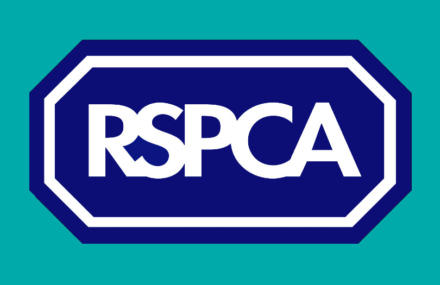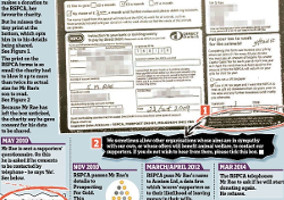The Information Commissioner’s Office has fined both the RSPCA and the British Heart Foundation for breaches of data protection law in their fundraising practices, following a Daily Mail exposé in September 2015.
The ICO this morning confirmed that it had fined the RSPCA £25,000 and the British Heart Foundation £18,000, after the Daily Mail today published an article citing the figures. But both the RSPCA and the British Heart Foundation have strongly condemned the ICO’s findings.
The fines are the result of an ICO investigation into both charities around so-called ‘wealth screening’ and selling of donor data, which begun after a Daily Mail investigation into the practice in September 2015.
The full findings of the investigation have not yet been published. The ICO had originally intended to publish at the end of the week, but is now expected to publish the full findings later today.
The British Heart Foundation said that it was considering whether to challenge the decision. The RSPCA has said that it will hold a meeting of its trustee board later this week to decide whether or not to make any "future response to the ICO's findings".
RSPCA and BHF “disappointed”
Simon Gillespie, chief executive of the British Heart Foundation, said: “We are extremely disappointed in the action the ICO has taken. The trust our supporters put in us demands high standards of fundraising and we take the data protection responsibilities that come with this very seriously.
“The British Heart Foundation has endeavoured to ensure our practices follow ICO and Institute of Fundraising guidelines and we are committed to constantly evolving and improving our approach.
“We find the decision surprising as earlier this year in June the ICO praised our data handling and said that they had no concerns about us as a data controller.
“In June 2015 we took the decision never to share our supporters’ data with other fundraisers and we have made it clear to our supporters that this is the case.
“We believe that key aspects of the ICO’s decision and findings are wrong, disproportionate and inconsistent. Our trustees will therefore consider whether it’s in the interests of our supporters and beneficiaries to challenge this decision.”
Jeremy Cooper, chief executive of the RSPCA, said: “We are disappointed at the ruling and disagree with the conclusions drawn by the ICO.
“There is no suggestion that we lost or sold any personal data, but rather the ICO considered the information we gave to supporters on how their personal data would be used was inadequate.
“There has been one acknowledged contravention, through an inadvertent error, which we ourselves brought to the ICO’s attention.
“We always strive to ensure that our practices fully comply with all relevant legislation and are carried out to a high standard. We are listening to the public and are changing the way we ask people to support our vital work which meets their needs and expectations, whilst safeguarding potentially vulnerable people.
“Our supporters and members are the heart of the Society. It is only thanks to them that we can do the work we do rescuing, rehabilitating and rehoming thousands of animals each year.”
‘Shaming of the charity vultures’
The Daily Mail published an article today which said that the ICO “fined the RSPCA last night for paying investigators to pry into donor’s wealth” after it launched an investigation into the swapping and sharing of people’s data following an article by the same paper in September 2015.
Today’s article goes on to say that, in the process of its investigation of the RSPCA, “the watchdog subsequently found that the British Heart Foundation was secretly carrying out wealth profiling too”.
The article said that “both charities were also found to have used unscrupulous firms to find out more information about donors and to have been sharing personal data with other organisations,” which, the Mail said, put those people at “risk of fraud”.
The paper said that the penalties "could open the floodgates for thousands of donors to sue the charities for misuse of their private information".
The Samuel Rae case
The findings of the ICO investigation and the Mail’s article this morning stem from an exposé carried out by the Daily Mail on 1 September 2015.
The Mail claimed that 87-year-old dementia sufferer Samuel Rae had been tricked into giving away £35,000 of his own money to “unscrupulous catalogue scammers”, who bought Mr Rae’s contact details from various charities.
While the original article did not name either the RSPCA or the British Heart Foundation, a follow up story on 2 September accused the RSPCA of “paying investigators to assess how much money donors might leave in their wills”.
It said the RSPCA passed Rae’s details on to Prospecting for Gold – a prospect research agency which works exclusively with charities – four times. PFG then used the data provided to “establish a score estimating” the wealth and “donor potential” of Mr Rae.
The RSPCA strongly disputed the claims at the time and said that legacy predictor modelling is “used by many charities” in the sector. It did however promise to review its use of supporter data.
Changes to the Code of Fundraising Practice
The death of Olive Cooke and the subsequent allegations around the selling and sharing of Samuel Rae’s data led to the IoF banning the sale of donor data to third parties, and a number of other amendments to the Code of Fundraising Practice.
Published on 21 September 2015, the IoF banned the selling of donor data by charities, made it mandatory for addressed mailing to carry a clear opt out message and said that charities could only share an individual’s data with a third party “if that individual has opted in and provided express consent”.
The changes were made in response to the interim report published by the FRSB in June 2015.
Peter Lewis, chief executive of the Institute of Fundraising, said: “Charities are only able to make a massive difference in the world because of the generosity of their supporters. No charity wants to damage that relationship.
“Over the last year we have seen a huge amount of change in the charity sector, improving fundraising practices that build on the many ways donors want to support the good causes they care about. We are confident that, if regulators like the ICO and charities can work better together, we can make sure standards continue to improve in the future for the benefit of donors and beneficiaries alike.“
The Fundraising Regulator has said it is unable to comment on the case until it has seen the full report from the ICO’s investigation.
Related Articles












